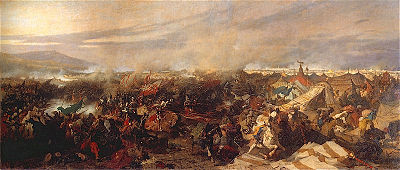Portal:Christianity/Selected picture/November 2006

The Battle of Vienna (Turkish: İkinci Viyana Kuşatması) (as distinct from the Siege of Vienna in 1529) took place on September 11 and September 12, 1683 after Vienna had been besieged by Turks for two months. It was the first large-scale battle of the Great Turkish War, yet with the most far-reaching consequences.
The siege itself began on 14 July 1683, by the Ottoman army commanded by Grand Vizier Kara Mustafa Pasha. The decisive battle took place on 12 September, after the united relief army of 70,000 men had arrived, pitted against the Ottoman army of approximately 138,000 men — although a large number of these played no part in the battle, as only 50,000 were experienced soldiers, and the rest less-motivated supporting troops.[1] King John III Sobieski of the Polish–Lithuanian Commonwealth had been made Commander in Chief of his own 30,000-man Polish forces and the 40,000 troops of Habsburg and their allies, led by Charles V, Duke of Lorraine.
The battle marked the turning point in the 300-year struggle between the forces of the Central European kingdoms and the Ottoman Empire. Over the sixteen years following the battle, the Habsburgs of Austria, and their allies gradually occupied and dominated southern Hungary and Transylvania, which had been largely cleared by the Turkish forces.
References
edit- ^ "Türkenbelagerung - Die Heere" (in German). Wein-Vienna. Retrieved 2006-08-28.